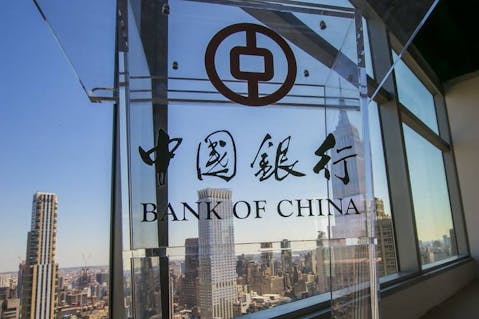In this article, we will look at 10 stocks at risk from a potential real estate crash in China. If you want to explore similar stocks, you can also take a look at China Real Estate Market Crash: 5 Stocks at Risk.
The Evergrande Group Sparks China’s Real Estate Crisis
China is the second-largest economy in the world and a major force that has driven that economic growth is the country’s real estate sector, which makes up about one-third of its GDP. The China Evergrande Group (OTC:EGRNF) was founded in 1996 and grew to become one of the real estate giants in China and the world. The China Evergrande Group (OTC:EGNRF) grew its assets to about $150 billion in a decade after its launch and stacked on debt to develop over 1,300 projects spread across roughly 280 cities in China as of 2022. This debt grew to a figure of roughly $300 billion in April 2022, as reported by Reuters, and made The China Evergrande Group (OTC:EGRNF) the most indebted property developer in the world.
The Three Red Lines
In August of 2020, the Chinese government passed regulations to limit the amount of debt property developers can acquire in China. The “three red lines” policy put constraints on three debt ratios that Chinese property developers had to follow to become eligible for taking on additional debt: liability-to-asset, debt-to-equity, and debt-to-assets. In October 2021, a majority of Chinese property developers violated the “three red lines” policy.
Mortgage Boycotts
China’s real-estate bubble is on the verge of popping and being the second-largest economy in the world, this could have some seriously adverse effects on the global markets. Mortgage boycotts in China are alarming the Chinese government and banks. Although it is unclear as of now how many homebuyers have stopped paying their mortgages, S&P Global Ratings estimates that the value of boycotted mortgages may amount to $145 billion. Bloomberg reported that Chinese banks, the nation’s $56 trillion sector, can suffer up to $350 billion worth of mortgages being boycotted in a worst-case scenario.
Possible Contagion
If China’s real estate sector goes bust, it could have adverse effects on the Chinese economy and global markets. The real estate sector has fueled China’s growth into an economic powerhouse and with its collapse, China could fall into a recession rather quickly. According to a report by OEC World, the mortgage crisis is causing a decline in Chinese imports of new residential construction products. In June 2022, imports of construction products into China dropped 15% year-over-year. Imports for forklifts dropped 58.17% year-over-year, heating machinery imports plummeted by 30.46%, and 13.5% fewer air pumps were imported into China in June 2022 than in the same month a year ago.
According to a Financial Times’ analysis, if the Chinese real estate sector collapses then it would provide a major blow to global commodity companies. If the Chinese real estate market crashes, it could throw the economy into a significant downturn, which would impact many large-cap companies that have significant revenue exposure to China. Some large-cap companies that have high revenue exposure to China include Micron Technology, Inc. (NASDAQ:MU), Apple Inc. (NASDAQ:AAPL), QUALCOMM, Incorporated (NASDAQ:QCOM), and Advanced Micro Devices, Inc. (NASDAQ:AMD).

Pixabay/Public Domain
Our Methodology
To determine 10 stocks that are vulnerable to a real estate crash in China, we reviewed companies that are exposed to the Chinese real estate and construction markets. We picked miners, construction companies, and pure-play Chinese real estate and real estate services companies. We arranged our picks in ascending order in terms of hedge fund ownership of those companies. The hedge fund sentiment was derived from Insider Monkey’s database which tracks roughly 900 elite hedge funds.
China Real Estate Market Crash: 10 Stocks at Risk
10. Ping An Insurance Company of China, Ltd. (OTC:PNGAY)
Number of Hedge Fund Holders: N/A
Ping An Insurance Company of China, Ltd. (OTC:PNGAY) provides financial products and services for insurance, banking, asset management, and fintech and health-tech businesses in the People’s Republic of China. The company operates through four segments: Insurance, Banking, Asset management, and Internet Financing.
The Financial Times reported that Ping An Insurance Company of China, Ltd. (OTC:PNGAY) suffered major losses in 2021. These losses were attributed to weakened demand in its life insurance segment and also its exposure to China Fortune Land Development, a major real estate developer in China, which cost Ping An Insurance Company of China, Ltd. (OTC:PNGAY) losses of Rmb 24.3 billion.
Ping An Insurance Company of China, Ltd. (OTC:PNGAY) is one of the largest insurance companies in the world by market cap, but it could suffer dramatically from a housing crisis in China. As of August 11, Ping An Insurance Company of China, Ltd. (OTC:PNGAY) shares have crashed more than 33.72% over the past 12 months.
Some large-cap U.S. companies such as Micron Technology, Inc. (NASDAQ:MU), Apple Inc. (NASDAQ:AAPL), QUALCOMM, Incorporated (NASDAQ:QCOM), and Advanced Micro Devices, Inc. (NASDAQ:AMD) are also likely to suffer if China undergoes a housing crisis and in turn a recession.
9. Leju Holdings Limited (NYSE:LEJU)
Number of Hedge Fund Holders: 2
Shares of Leju Holdings Limited (NYSE:LEJU) are falling as a potential housing crisis shakes up the Chinese economy. As of August 11, the stock has lost 85% of its value over the past year. Leju Holdings Limited, (NYSE:LEJU) provides online-to-offline real estate services in the People’s Republic of China. The company offers real estate e-commerce, online advertising, and online listing services through its online platform, which comprises websites covering 401 cities and various mobile applications. Moreover, the company offers fee-based online property listing services to real estate agents, and services to individual property sellers. The company was incorporated in 2013 and is headquartered in Beijing.
At the close of Q1 2022, 2 hedge funds held stakes in Leju Holdings Limited (NYSE:LEJU), valued at less than $1 million in total, down from $1.03 million a quarter ago from 3 long positions. As of March 31, Renaissance Technologies is the most prominent shareholder in Leju Holdings Limited (NYSE:LEJU), owning roughly 1.02 million shares of the company.
8. Xinyuan Real Estate Co., Ltd. (NYSE:XIN)
Number of Hedge Fund Holders: 3
Xinyuan Real Estate Co. Ltd. (NYSE:XIN) engages in residential real estate development and construction in the People’s Republic of China, the United States, and internationally. The company develops residential projects, such as multi-layer apartment buildings, sub-high-rise apartment buildings, high-rise apartment buildings, and auxiliary services and amenities, such as retail outlets, leisure and health facilities, kindergartens, and schools, as well as office, mixed-use, and commercial properties.
If the mortgage crisis in China does not ease, Xinyuan Real Estate Co., Ltd. (NYSE:XIN) could lose a significant amount of its value. As of August 11, Xinyuan Real Estate Co. Ltd. (NYSE:XIN) shares have cratered by 72.77% over the past 12 months.
At the close of Q1 2022, 3 hedge funds held stakes in Xinyuan Real Estate Co., Ltd. (NYSE:XIN). The total value of those stakes amounted to about $140,000, up from about $120,000 a quarter earlier. As of March 31, Renaissance Technologies is the top shareholder in Xinyuan Real Estate Co., Ltd. (NYSE:XIN), owning about a $100,000 stake in the company.
7. Fanhua Inc. (NASDAQ:FANH)
Number of Hedge Fund Holders: 4
Fanhua Inc. (NASDAQ:FANH) is directly at risk from a housing downturn in China. As of August 11, Fanhua Inc. (NASDAQ:FANH) has lost 63.18% of its value over the past 12 months.
Fanhua Inc. (NASDAQ:FANH) distributes insurance products in China. The company operates through two segments: Insurance Agency and Claims Adjusting. The Insurance Agency segment provides property and casualty insurance products that primarily include individual accident, travel, homeowner, and indemnity medical insurance products. The Claims Adjusting segment offers pre-underwriting surveys, claims adjusting, residual value disposal, loading and unloading supervision, and consulting services.
At the end of Q1 2022, 4 hedge funds were bullish on Fanhua Inc. (NASDAQ:FANH), with stakes valued at $1.29 million in total. That was down from 7 hedge funds with stakes worth $2.83 million a quarter earlier. As of March 31, Arrowstreet Capital is the leading shareholder in Fanhua Inc. (NASDAQ:FANH), owning about $720,000 worth of FANH shares.
6. BHP Group (NYSE:BHP)
Number of Hedge Fund Holders: 19
BHP Group Limited (NYSE:BHP) is one of the world’s largest producers of iron ore and a prominent supplier to China. BHP Group (NYSE:BHP) runs the risk of suffering major drops in sales if the housing market in China crashes. Bloomberg reported that China produces approximately 1 billion tons of steel each year and with a housing downturn, Goldman Sachs analysts expect steel demand to contract by 5% in 2022. As of August 11, BHP Group (NYSE:BHP) has lost 20.14% over the past 12 months.
Wall Street is bearish on BHP Group (NYSE:BHP). On July 20, Credit Suisse analyst Danielle Chigumira lowered her price target on BHP Group (NYSE:BHP) to 2,200 GBP from 2,500 GBP and maintained a ‘Neutral’ rating on the shares. This July, JPMorgan analyst Lyndon Fagan trimmed his price target on BHP Group (NYSE:BHP) to 2,440 GBP from 2,510 GBP and also reiterated a ‘Neutral’ rating on the shares.
At the close of Q1 2022, 19 hedge funds held collective stakes in BHP Group (NYSE:BHP) valued at $2.24 billion. At the end of 2021, there were 25 hedge fund shareholders of the company, owning stakes worth $2.02 billion. As of June 30, Fisher Asset Management is the largest shareholder in BHP Group (NYSE:BHP), with a $1.01 billion stake in the company. The investment covers 0.71% of the value of Ken Fisher’s 13F portfolio.
Like Micron Technology, Inc. (NASDAQ:MU), Apple Inc. (NASDAQ:AAPL), QUALCOMM, Incorporated (NASDAQ:QCOM), and Advanced Micro Devices, Inc. (NASDAQ:AMD), BHP Group (NYSE:BHP) is taking a beating in 2022 alongside the broader Chinese economy.
Click to continue reading and see China Real Estate Market Crash: 5 Stocks at Risk.
Suggested articles:
- China Crackdown is Crushing These 10 Stocks
- The 9 China Rebound Stocks to Buy According to Jim Cramer
- 11 Best Housing/Homebuilder Stocks To Buy Now
Disclosure: None. China Real Estate Market Crash: 10 Stocks at Risk is originally published on Insider Monkey.





